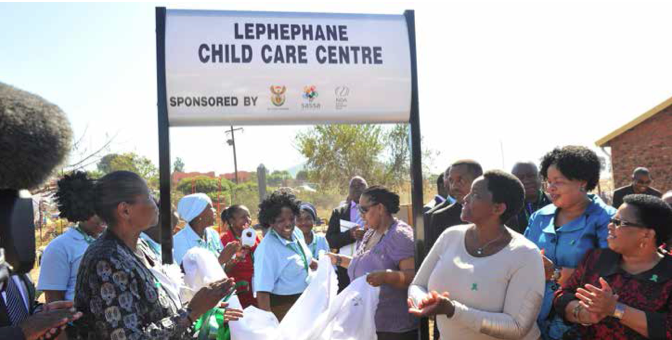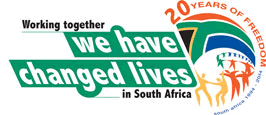Social Development Month
Since the dawn of democracy, the Department of Social Development has extended social services and grants to all needy South Africans, making life more bearable for people who would otherwise be living in abject poverty.
 Vulnerable South Africans , including children in need and the elderly, can access many services and social grants provided by the state. These include various types of grants, food relief programmes, early childhood development centres, old age homes, home-based and com- munity-based care for people living with HIV and Aids, foster care, adoption services, child protection services and maintenance.
Vulnerable South Africans , including children in need and the elderly, can access many services and social grants provided by the state. These include various types of grants, food relief programmes, early childhood development centres, old age homes, home-based and com- munity-based care for people living with HIV and Aids, foster care, adoption services, child protection services and maintenance.
To mark Social Development Month this October, the Department of Social Development has launched its new flagship programme, Project Mikondzo, which means “increasing the footprints”, in Xitsonga.
The project will focus on 1 300 of the poorest wards in the country, bringing a wide range of services to those communities. The intention is to extend the reach of the services that the department and its entities provide to South Africans at community level. “How can we begin to understand the plight of our people without walking in their footsteps?” asks Minister Bathabile Dlamini.
But the department faces huge challenges in its endeavour to reach out to the needy. Despite the many strides made in uplifting communities, the department is confronted by harsh realities that face thousands of South Africans today, such as hunger, domestic violence and abuse.
“We deal with families, problems of disintegration, families that face unemployment due to the economic downturn, families plagued by domestic violence, women and children who suffer from abuse: we deal with child- and youth-headed households, substance and alcohol abuse - these all lead us back to creating a solid foundation for children and families,” says Minister Dlamini.
Access to grants
Before 1996, only two million people were receiving grants. This number has increased to about 15 million recipients today. What is an even greater achievement, says Minister Dlamini, is that the better part of the grants, approximately 11 million are children. “This allows us as a government to build the best foundation for our children, and ensure that no child goes to school without a plate of food.” The department has also made great strides in increasing the older persons grant from bimonthly to monthly. Previously women received a grant at 60 and men at 65. "We have since equalised this to 60 years old,”Minister Dlamini adds.
Early Childhood Development (ECD)
The department is focused on creating a better foundation for children and families by increasing access to ECD services. ECD provides the crucial educational foundation in the first four years of a child's life. This is a critical stage in the grooming of human beings - when their emotional, psychological and physical stability, behaviour and intellect are instilled. The department is working towards ensuring that all ECD centres are registered and early childhood practitioners are appropriately trained. “I strongly believe that if we as a country and as a department can focus on children, we can take many families out of this cycle of poverty,” says Minister Dlamini.
Placing a focus on parenting
Many factors affect a child's growth or a family's development. To assist parents in enhancing the formative years of children, the department has launched various empowerment programmes. These include teaching parents, through the help of social workers, to assist and mould children, and to create a safe and stable family setting. One of the major challenges affecting our society is that of alcohol and substance abuse. “This is a battle that government cannot fight alone. It goes back to parenting, and parents have to take responsibility play their role,” says Minister Dlamini.
Programmes for parental training are also underway. The programme will see social workers going into communities to teach parents on parenting. Parents need to be taught the basic fundamentals about parenting. “We have so many young mothers aged 15, who have no idea on how to parent. We have parents who work and neglect their parenting duties and do not understand the roles and responsibilities that actually come with being a parent.”
What children in our society lack is trust and guidance, adds Minister Dlamini. “Parents need to build trust amongst their children and not fail them, so that children are able to tell their parents what is actually going on around them. They should be the first ones to report abuse or any challenges they face.”
Creating a support system
South Africa has more than a million orphans, - children who live with their grandmothers and children who take care of themselves and their younger siblings. “Through child support grants, we will have fewer children not attending school and a lower rate of drop-outs,” says Minister Dlamini. Another huge project soon to be rolled will complement the child support grant and eventually take young people off the grant system. The new programme will encourage and help young mothers and caregivers to improve their skills and try harder to find work. The ultimate goal will be to get people to be economically active instead of relying on grants.
“We have already established an agreement and are working together with the Department of Basic Education to ensure that young children attend school and young mothers who have dropped out of school also complete their schooling,” explains the Minister.
In addition, mothers must find employment, at least twice a week, which will develop their skills and in the long run enable them to find full-time employment so they in turn will not need or rely on a child support grant.
-
 No child should go hungry. The number of children on child support grants has grown from 21 997 in 1999 to 11 million in 2013.
No child should go hungry. The number of children on child support grants has grown from 21 997 in 1999 to 11 million in 2013. - We care for older persons. The number of people on old age grant increased by a third from 1997 to 2013. Old age grant recipients grew from 1.9 million in 1997 to 2.9 million in 2013.
- Protecting people against poverty, , the total number of people on social grants has grown from 3 million in 1997 to 16 million in 2013.
Source: South African Social Security Agency



 Facebook
Facebook Twitter
Twitter WhatsApp
WhatsApp